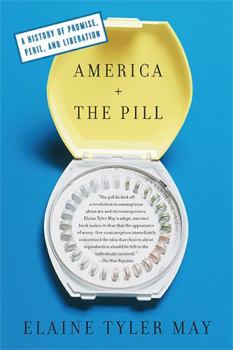America and the Pill: A History of Promise, Peril, and Liberation
Select Format
Select Condition 
Book Overview
In 1960, the FDA approved the contraceptive commonly known as "the pill." Advocates, developers, and manufacturers believed that the convenient new drug would put an end to unwanted pregnancy, ensure happy marriages, and even eradicate poverty. But as renowned historian Elaine Tyler May reveals in America and the Pill, it was women who embraced it and created change. They used the pill to challenge the authority of doctors, pharmaceutical companies, and lawmakers. They demonstrated that the pill was about much more than family planning-it offered women control over their bodies and their lives. From little-known accounts of the early years to personal testimonies from young women today, May illuminates what the pill did and did not achieve during its half century on the market.
Format:Paperback
Language:English
ISBN:0465024599
ISBN13:9780465024599
Release Date:September 2011
Publisher:Basic Books
Length:232 Pages
Weight:0.62 lbs.
Dimensions:0.7" x 5.5" x 8.2"
Age Range:18 years and up
Grade Range:Postsecondary and higher
Customer Reviews
2 ratings
History and Current Events
Published by Thriftbooks.com User , 14 years ago
50 years ago, this past May 2010, the FDA announced approval for the birth control pill. In the early 60's, the pill was heralded as a mean to contain the population explosion, eradicate war and poverty worldwide and ensure stable marriages. As the decade unfolded, many credited or blamed the pill for the sexual revolution that became worldwide. Professor May offers a unique personal perspective on the drug's history: her father was a clinical researcher who worked on developing the pill, and her mother was involved in the birth control movement. In the early 70's, at her father's suggestion, she joined a clinical trial of the new pill and her medical records are now among the thousands used to document the safety and effectiveness of the slow-dose pill. Other topics discussed in this study include the women who have been responsible for the pill's success, from Margaret Sanger and Katherine McCormick to the hundreds of women who volunteered for the early, risky clinical trials. Men's changing relationship to the pill and numerous efforts to create an oral contraceptive for men are also discussed. Reviewed by Claude Ury
Outstanding book
Published by Thriftbooks.com User , 14 years ago
Historian May traces the development of the contraceptive pill and concludes: The feminist movement liberated women and used the pill as an important tool to gain control over their lives; there is no evidence that the pill caused a boom in premarital sex; and the pill has had little impact on world fertility rates or overpopulation. May shows that the pill simply enlarged the repertory of methods available to women to reduce the power gap between men and women. "The pill has been at the center of the major transformations in women's lives over the past half-century." And she shows "how much has changed and how much has remained the same." May traces the legal battles over contraception and also focuses on the Vatican "old boys club" 1968 rejection of its own theological commissioners' 73 to 10 recommendation that it relax its opposition to contraception, a rejection ignored by the overwhelming majority of Catholics. This book easily rates five stars. --- Edd Doerr, President, Americans for Religious Liberty





